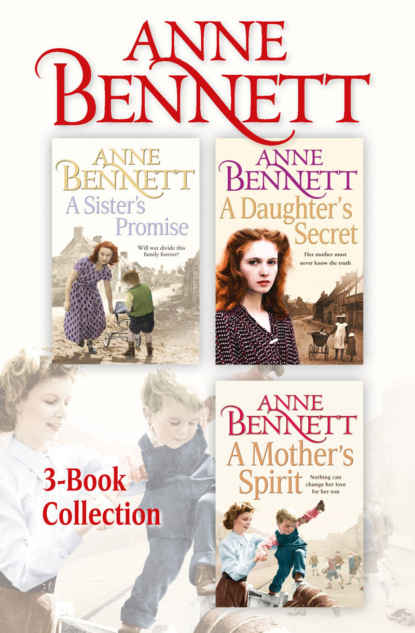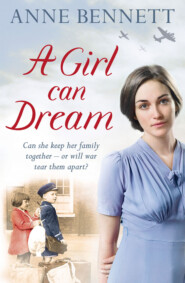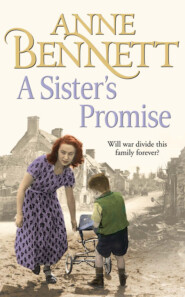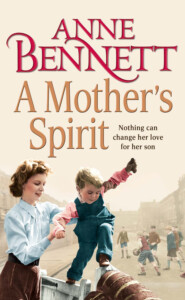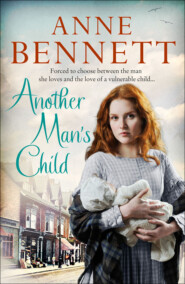По всем вопросам обращайтесь на: info@litportal.ru
(©) 2003-2025.
✖
Anne Bennett 3-Book Collection: A Sister’s Promise, A Daughter’s Secret, A Mother’s Spirit
Настройки чтения
Размер шрифта
Высота строк
Поля
‘I don’t know,’ Cathy said. ‘But personally I think you have a right to know if letters came for you and you never got them. We’ll be having dinner soon and we’ll bring it up at the table.’
Cathy did bring it up and Nellie looked decidedly uncomfortable. She knew of the letters that had come for Molly as she knew of the missive Biddy had sent banning them, though at first, despite that, the letters came thick and fast. She hadn’t thought to mention any of this to her daughter, though as she watched the friendship develop between them, she had thought the day might come when she would have to explain herself. So when she was asked so directly she said to Molly, ‘There were letters that came for you, at first anyway, but your grandmother obviously thought that it was better you didn’t see them.’
Nellie looked into Molly’s eyes, so sad they were like pools of pain in that battered face, and her stomach contracted in pity for the young girl.
‘I don’t know if you were aware of the letter Biddy sent, banning all communication, Molly. I only know myself because she told me. I thought it was the wrong thing to do then and I told her so, and I haven’t changed my opinion. Anyway, those in Birmingham took no notice at first either because for a time the letters continued to come.’
Cathy was perplexed. She looked at her friend and recognised her suffering as she burst out, ‘But why did you give them to the postman, Mammy, knowing that Molly wasn’t going to be allowed to receive them?’
‘I didn’t know that absolutely at first,’ Nellie protested. ‘It was only when Molly never mentioned anything about them that I had my suspicions. After that, every time I put the letters for you in the sack, my heart would sink. It was almost a relief when they eventually stopped coming.’
‘I still don’t understand why you gave letters to the postman when you realised that?’ Cathy insisted.
Nellie bit back, ‘I did it because I had to.’
Cathy shook her head. ‘You could have just left them all here and Molly could have had them when she came over on Sunday.’
‘If only you knew just how often I have been tempted to do just that,’ Nellie said. ‘But withholding mail is a serious offence, and one I would be in really hot water for if it were brought to the authority’s notice.’
‘But isn’t Molly’s grandmother withholding her mail?’
‘Yes, but Molly is a minor and under her grandmother’s care,’ Nellie said. She felt burdened by her part in all this, and in an effort to explain she addressed herself again to Molly.
‘If I was to do this and your grandmother was to find out, she could make trouble for me because of it, and you know, don’t you, Molly, that she would delight in doing that?’
Molly loved Nellie, the woman who had shown her nothing but kindness from the very first, and she saw immediately her dilemma.
‘It’s all right,’ she said. ‘I do understand, and you are right, my grandmother would love to get you into trouble – I know that as well as you – and I would hate it and feel responsible.’
‘If only we could find a way around this,’ Cathy mused.
Jack had taken no part in the discussion so far, but now he said sharply to his daughter, ‘Cathy, stop this at once. Your mother has explained it to you. Let that be an end to it.’
‘But what if Molly was to write from here and they could write back, addressing their letters to me?’
Nellie stared at her daughter. In fact, they all stared at her. Nellie knew she shouldn’t agree to this, but Jack said, ‘Don’t see any harm in that, Nellie. After all, there is no law in the land that says Cathy can’t write to anyone in the world if she takes a mind.’
‘The postman will wonder,’ Nellie said.
‘Yeah, he might, but he won’t connect it with Molly, will he?’ Cathy said. ‘You can tell him that I have a couple of pen friends in England, if you like. They are always advising us to do that at school, to broaden our horizons or something. Some of the others already do it, so it won’t seem all that strange.’
‘Do you know,’ Jack said, ‘it may just work. What d’you say, Molly?’
Molly turned her eyes on Jack and he saw the little flame of hope that had suddenly burned within her go out. She knew writing to her people was as remote a reality as ever, because she couldn’t afford writing pad and envelopes, never mind stamps every week. Jack, though, guessed what was troubling her and, excusing himself, he left the table, coming back a few minutes later with a writing pad, a stack of envelopes and two pens.
‘Here you are, Molly,’ he said. ‘Merry Christmas, and don’t you worry about stamps, for I will buy them for you myself and will be glad to do it.’
Molly looked around the table at those good, kind people, so eager and willing to help her, and suddenly it was all too much, and she laid her head on the table and cried her eyes out.
ELEVEN (#ulink_e639fde0-6423-5b71-ab23-5d982b95e853)
When Stan had first received the command from Biddy that he stop writing to Molly, he went to see Hilda to find that she had received a similar letter. Even knowing Biddy’s character as he did, he didn’t think that she really and truly intended to totally cut the orphan child off from those who loved her and that when she had thought about it, she would relent. Hilda agreed with him and for a while they continued to write, until it was obvious from the silence that the letters were not getting through.
Stan had been so concerned that eventually, as Christmas was approaching, he had screwed up his courage to see Paul Simmons to tell him of his anxieties and ask his advice. Paul Simmons said he had reason to be concerned and admitted to Stan that he hadn’t taken to Biddy Sullivan when he had seen her at the funeral. He said he had been worried and a little dismayed when he realised that Molly was going to live with the old harridan in some godforsaken hole in Ireland.
‘There was nothing else for it,’ Stan said. ‘Even without the influence of the Church – though it would never do to underestimate the power that has – they couldn’t let her live with me, her being a girl and all, without a woman’s presence in the house.’
‘I crossed my mind to make her my ward,’ Paul said. ‘But then I thought I have a job of work to do, so she would be in the care of servants and that wouldn’t be any good either. I was advised by a Catholic friend not even to bother mentioning the idea, because the Church would shoot it down in flames.’
‘That’s the very devil of it,’ Stan said. ‘We were both helpless.’
‘Yes, we were,’ Paul said. ‘However, this situation cannot be allowed to continue. Unfortunately, I am tied up all over Christmas and into the New Year, but in the spring, when the weather is a little more conducive to crossing the sea, I will go over and see the situation first-hand.’
Stan had been so relieved, but before that plan could be put into action, he received another letter from Molly at the very start of the New Year.
She never mentioned her grandmother, though she said a lot about Tom, the kindness of the townsfolk, her friendship with the McEvoys and particularly her best friend and ally, Cathy, who had devised this plan on how to keep in contact.
When Molly received the first letter back from her granddad she felt his love and concern for her could almost be lifted from the page. Kevin had drawn her a picture he had obviously signed all on his own and it was of their old house and all of them in it, including their parents. It saddened Molly and she was glad to turn to Hilda’s letter. The woman always had the ability to make her smile and, as she wrote as she spoke, it was just like having her in the room.
In rural Ireland, particularly on the farm, one day seemed very like another to Molly, and it was hard for her to visualise what was happening in other places, particularly the city she had been born in. When Molly had left Birmingham it had been a very depressed city in many ways, and from what her grandfather told her in his letters in 1936, it was in no better shape.
And then, in late January, the King died. Molly remembered the dour, bewhiskered King, whose picture had been plastered everywhere in Birmingham in the weeks prior to his Jubilee celebrations the previous year.
No one in Ireland was the least bit bothered about which king or queen would be sitting on the throne in England, but it seemed that those in Birmingham at least had a lot to say about it. They weren’t that concerned about the old King dying so much as who was to succeed him and that was to be his handsome and flamboyant son Edward, who would then be known as Edward VIII.
‘Handsome is as handsome does, I always say,’ Hilda wrote in her letter.
The point is he is too flippant in my opinion to be a good ruler. Never taken his duties that serious, like, and now that he is the King he will have to show what he is made of. The first thing he will have to do is dump that American divorcee Wallace Simpson that seems intent on hanging on to his coattails. His days of gallivanting around the world with her are gone and the sooner he realises that the better it will be for everyone.
Molly’s granddad said much the same, but it seemed the new King had no intention of knuckling down like people expected him to. Even the Irish papers had got hold of the story in the end.
‘He is handsome, you have to admit,’ Cathy said one Sunday in early February. She had the Irish Times spread out on her bed and both girls had been scrutinising it.
‘Oh, I think everyone agrees with that,’ Molly said. ‘But as Hilda said, being good-looking doesn’t mean he will be a good king. And he can’t have that woman as the Queen,’ she said, jabbing her finger at Edward’s escort who was gazing up at him with adoring eyes, though, even through the grainy newsprint, Molly thought her eyes looked calculating. ‘I mean, she’s another handsome one. Beautiful, in fact, and up to the minute with fashion, might even be really nice, but none of that will matter because the British people will never accept her. Queen Wallace, can you imagine?’
Cathy laughed. ‘Doesn’t sound quite right, I must admit, but we could talk about it till the cows come home and it won’t make a bit of difference. And meanwhile, there is something else happening next week that I think will prove to be far more entertaining – like your birthday, for instance.’
‘Yeah, and thanks to you I will have cards from everyone,’ Molly said. ‘I know I can’t put them up or anything, but I will get them and that is more than I had at Christmas. I’m so grateful for you all doing this, Cathy, you having the idea in the first place and your parents providing the wherewithal. I don’t know if you realise how much I appreciate it.’
‘Course we realise,’ Cathy said. ‘You have told us enough times. Didn’t Daddy say last time you started on that if he heard one more thank you from you then you could buy your own stamps.’
Molly smiled. ‘Yes, he did.’
‘Well then, think on,’ Cathy said, jumping to her feet. ‘Come on, let’s go to Swan Park and see if the snowdrops and crocuses are out yet like Bernadette said they were.’
‘You’re on,’ Molly said, knowing that in the main it was always wiser to fall in with Cathy’s plans.
However, Molly had a surprise awaiting her the following week. Stan had been to see Paul Simmons on receipt of Molly’s letter outlining the new arrangements to ensure that she received her mail, and Paul was irritated by the subterfuge and thought it sounded draconian to deprive an orphaned child of letters from family and friends.





